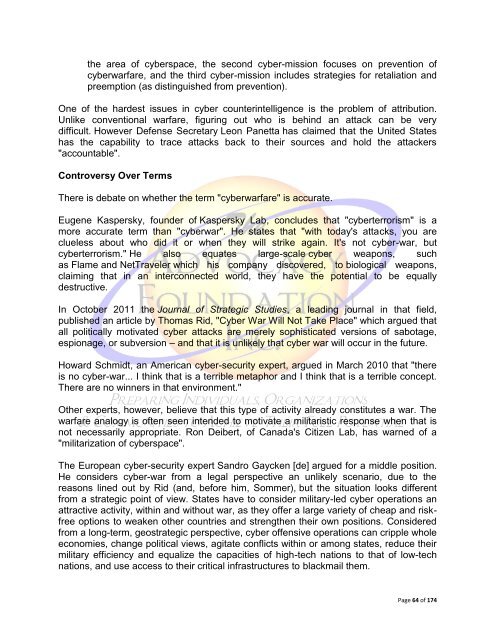International Cyber Terrorism
International Cyber Terrorism
International Cyber Terrorism
- No tags were found...
You also want an ePaper? Increase the reach of your titles
YUMPU automatically turns print PDFs into web optimized ePapers that Google loves.
the area of cyberspace, the second cyber-mission focuses on prevention of<br />
cyberwarfare, and the third cyber-mission includes strategies for retaliation and<br />
preemption (as distinguished from prevention).<br />
One of the hardest issues in cyber counterintelligence is the problem of attribution.<br />
Unlike conventional warfare, figuring out who is behind an attack can be very<br />
difficult. However Defense Secretary Leon Panetta has claimed that the United States<br />
has the capability to trace attacks back to their sources and hold the attackers<br />
"accountable".<br />
Controversy Over Terms<br />
There is debate on whether the term "cyberwarfare" is accurate.<br />
Eugene Kaspersky, founder of Kaspersky Lab, concludes that "cyberterrorism" is a<br />
more accurate term than "cyberwar". He states that "with today's attacks, you are<br />
clueless about who did it or when they will strike again. It's not cyber-war, but<br />
cyberterrorism." He also equates large-scale cyber weapons, such<br />
as Flame and NetTraveler which his company discovered, to biological weapons,<br />
claiming that in an interconnected world, they have the potential to be equally<br />
destructive.<br />
In October 2011 the Journal of Strategic Studies, a leading journal in that field,<br />
published an article by Thomas Rid, "<strong>Cyber</strong> War Will Not Take Place" which argued that<br />
all politically motivated cyber attacks are merely sophisticated versions of sabotage,<br />
espionage, or subversion – and that it is unlikely that cyber war will occur in the future.<br />
Howard Schmidt, an American cyber-security expert, argued in March 2010 that "there<br />
is no cyber-war... I think that is a terrible metaphor and I think that is a terrible concept.<br />
There are no winners in that environment."<br />
Other experts, however, believe that this type of activity already constitutes a war. The<br />
warfare analogy is often seen intended to motivate a militaristic response when that is<br />
not necessarily appropriate. Ron Deibert, of Canada's Citizen Lab, has warned of a<br />
"militarization of cyberspace".<br />
The European cyber-security expert Sandro Gaycken [de] argued for a middle position.<br />
He considers cyber-war from a legal perspective an unlikely scenario, due to the<br />
reasons lined out by Rid (and, before him, Sommer), but the situation looks different<br />
from a strategic point of view. States have to consider military-led cyber operations an<br />
attractive activity, within and without war, as they offer a large variety of cheap and riskfree<br />
options to weaken other countries and strengthen their own positions. Considered<br />
from a long-term, geostrategic perspective, cyber offensive operations can cripple whole<br />
economies, change political views, agitate conflicts within or among states, reduce their<br />
military efficiency and equalize the capacities of high-tech nations to that of low-tech<br />
nations, and use access to their critical infrastructures to blackmail them.<br />
Page 64 of 174
















